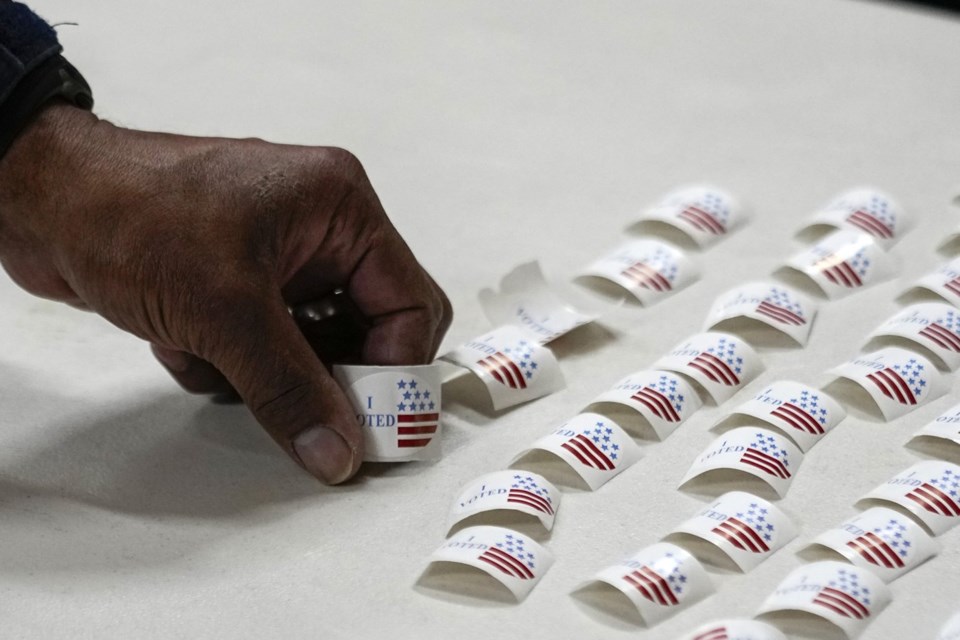NEW YORK (AP) — A judge on Thursday blocked the Trump administration from immediately enacting certain changes to how federal elections are run, including adding a proof-of-citizenship requirement to the federal voter registration form.
The decision is a setback for President Donald Trump, who has argued the requirement is needed to restore public confidence in elections. But the judge allowed other parts of Trump's sweeping executive order on U.S. elections to go forward for now, including a directive to tighten mail ballot deadlines around the country.
Trump's March executive order overhauling how U.S. elections are run prompted swift lawsuits from the League of United Latin American Citizens, the League of Women Voters Education Fund, the Democratic National Committee and others, who called it unconstitutional.
U.S. District Judge Colleen Kollar-Kotelly in Washington sided with voting rights groups and Democrats, saying that the Constitution gives the power to regulate federal elections to states and Congress — not the president. She noted federal lawmakers are currently working on their own legislation to require proof of citizenship to vote.
In a 120-page decision on Thursday, she said the plaintiffs had proven that the proof-of-citizenship requirement would cause their clients irreparable harm and go against the public interest, while the government had offered “almost no defense of the President’s order on the merits.”
Accordingly, she granted a preliminary injunction to stop the citizenship requirement from moving forward while the lawsuit plays out.
The judge also blocked part of the Republican president’s order requiring public assistance enrollees to have their citizenship assessed before getting access to the federal voter registration form.
But she denied other requests from a group of Democratic plaintiffs, including refusing to block Trump's order to require all mailed ballots to be received by Election Day nationwide. She also did not touch Trump's order to open certain databases to billionaire Elon Musk's Department of Government Efficiency to allow it to review state voter lists to search for noncitizens. The judge said those arguments brought by Democrats were either premature or should be brought by states instead.
The plaintiffs had argued Trump's proof-of-citizenship requirement violated the Constitution’s so-called Elections Clause, which gives states and Congress the authority to determine how elections are run.
They also argued that Trump’s order asserts power that he does not have over an independent agency. That agency, the U.S. Election Assistance Commission, sets voluntary voting system guidelines and maintains the federal voter registration form.
During an April 17 hearing, attorneys for the plaintiffs had said requiring proof of citizenship on the federal voter registration form would complicate their clients’ voter registration drives at grocery stores and other public places.
Aria Branch, counsel for the Democratic National Committee and other Democratic plaintiffs, also argued the executive order’s effort to tighten mail ballot deadlines would irreparably harm her clients by forcing them to reallocate resources to help voters navigate the changes.
“That’s time, money and organizational resources and strategy that can’t be recouped,” she said.
Michael Gates, counsel for the Trump administration, said in the hearing a preliminary injunction wasn’t warranted because the order hadn’t been implemented and a citizenship requirement would not be on the federal voter registration form for many months.
Roman Palomares, president of the League of United Latin American Citizens, a nonpartisan plaintiff, said Thursday the judge's decision was a “victory for voters.”
“Efforts to silence the voice and votes of the U.S. electorate must not stand because our democracy depends on all voters feeling confident that they can vote freely and that their vote will be counted accurately,” he said in a statement.
Representing the Democratic plaintiffs, Branch said in a Thursday statement that “this fight is far from over” but called the ruling a “victory for democracy and the rule of law over presidential overreach."
The Justice Department's Civil Rights Division said it was disappointed by the ruling.
“Few things are more sacred to a free society or more essential to democracy than the protection of its election systems,” said Harmeet Dhillon, assistant attorney general for civil rights.
Donald Palmer, chair of the EAC, a defendant in the case, said his office was still reviewing the ruling and opinion “but we will comply with the Judge's decision.”
The judge's decision comes as state and local election officials from across the country are meeting to consider the implications of Trump’s executive order on their work.
The U.S. Election Assistance Commission’s Standards Board, which was holding a public hearing in North Carolina on Thursday, is a bipartisan advisory group of election officials from every state that meets annually.
Meanwhile, other lawsuits against Trump’s order are still pending.
In early April, 19 Democratic attorneys general asked the court to reject Trump’s executive order. Washington and Oregon, which both hold all-mail elections, followed with their own lawsuit against the order.
The U.S. differs from many other countries in that it does not hold national elections run by the federal government. Instead, elections are decentralized — overseen by the states and run by thousands of local jurisdictions.
___
Associated Press writer Christina A. Cassidy contributed from Atlanta.
Ali Swenson, The Associated Press



